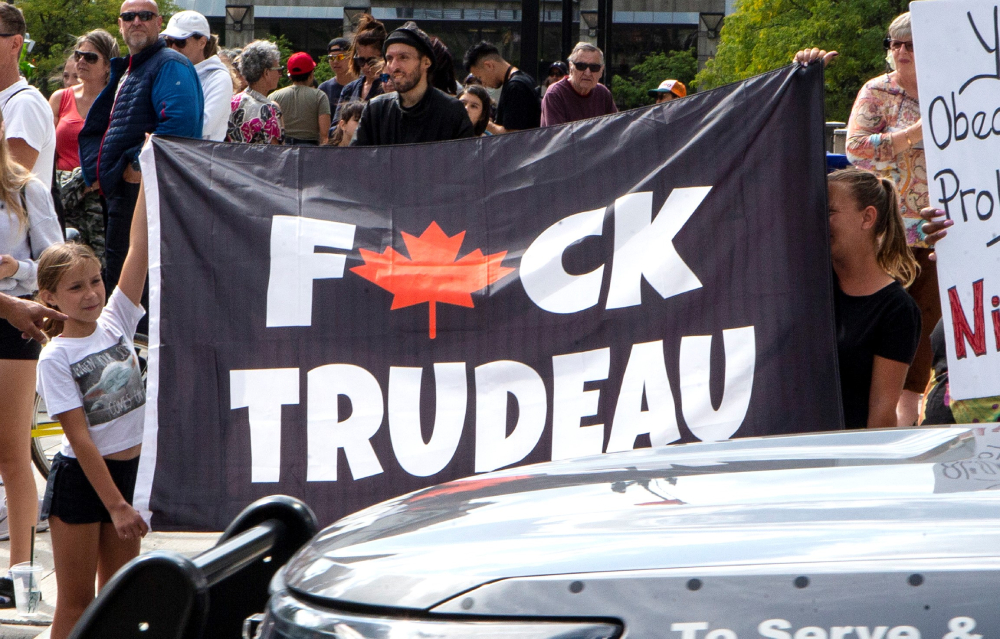Chris Tenove is an expert on toxicity levels in the Canadian political conversation. He waded into the pollution first as a journalist, including as one of The Tyee’s first reporters, and now as a scholar, writing extensively about disinformation, online harms and social media regulation. Last year he authored, with Heidi Tworek, Trolled on the Campaign Trail: Online Incivility and Abuse in Canadian Politics, published by UBC’s Centre for the Study of Democratic Institutions.
We caught up with Tenove, a postdoctoral researcher with UBC’s political science department, to get his perspective on the current campaign scene, replete with flipped birds, thrown stones and hurled conspiracy notions.
In response, he issues a challenge to “The Tyee’s awesome community.” Tenove suggests people offer alternatives by sharing links to positive examples of online political conversation in the comments thread to this article. Here’s our interview.
The Tyee: We’re seeing gravel thrown at the campaigning PM, other candidates spat upon and slapped. Canada’s election culture seems to have shifted into a new low gear. How much is due to the internet and its ability to mobilize bad actors?
Chris Tenove: There have been some very disturbing scenes during this election campaign. Of course, shouting at politicians, and even threatening them, is not new. We know Trudeau wore a bullet-proof vest to some events in the last election, and the RCMP has been dealing with rising threats made against politicians since then. We do seem to be on an ugly trajectory.
I’m not sure we know precisely who has been organizing those recent violent episodes in Canada. But the internet, including social media, is how most of us co-ordinate our activities these days, whether we are canvassing for political parties, protesting climate change, or planning an assault on the U.S. Capitol.
One concern I have is that small extremist groups find each other online and offline, cross-fertilize ideas and recruit more individuals to take more hostile actions. We’ve seen this with the QAnon conspiracy theories, which originate in the U.S. but have surprising uptake in Canada.
Can you unpack the anti-vax movement as an online phenomenon or political force?
That’s a big question, and I think a complicated one.
For starters, I try to avoid using the term “anti-vaxxer,” because it lumps together some very different groups.
I’m fully vaccinated, and evidence of their effectiveness continues to mount in medical journals and B.C. hospitals. Some people remain unvaccinated because of logistical obstacles, or a lack of public health outreach in languages they understand.
But there are also understandable concerns people might have about vaccine policies. For instance, unlike Canada, the U.K. government has not yet approved widespread vaccines for 12- to 15-year-olds, as its advisory council continues to examine vaccine risks and benefits for an age cohort that faces lower risks from COVID-19 than other age groups. (They may do so as more evidence comes in.)
The requirement for vaccine passports for many activities in B.C. and other provinces is a dramatic policy, albeit a response to an unprecedented situation. I can understand why people with (well-founded!) suspicion of major pharmaceutical companies, or with different understandings of health and bodily integrity, might be concerned.
We need to be able to have reasonable conversations with people who don’t support certain vaccine policies at this point in time, to listen to their concerns and address them if we can.
At the same time, it’s clear that there are bad actors leveraging this issue for personal profit or more malign aims. A recent study of right-wing extremism in Canada by the Institute for Strategic Dialogue found COVID-19 was the most widely discussed topic in these communities, often voicing conspiracy theories and anti-government anger. We want to isolate people who push views like those, and not push people with health concerns into their camp.
You studied the online harassment of candidates in the last federal election, working with Heidi Tworek and other colleagues at UBC and the University of Ottawa. What did you learn?
In short: running for office is no picnic.
We analyzed over one million tweets at candidates during the 2019 campaign. We found that about 16 per cent we termed abusive, ranging from strong insults to hateful or threatening remarks. Another 25 per cent were uncivil, which were dismissive or disrespectful (e.g. “You’re a fraud.”). Just seven per cent were positive.
We also interviewed 31 candidates and campaign staff. Political veterans confirmed our intuition that the experience of running for office really is worse these days. The negative messages are coming all the time, and they are there for others to see. One candidate described having a pleasant moment watching the sunrise while on the ferry, and posting a photo. Not long after, someone replied, “I wish I was there to throw you off!”
Prime Minister Justin Trudeau gives a thumbs up to a protestor giving him the finger at a campaign stop in Brantford, Ontario.
— Carlos Osorio (@carlososorio) September 6, 2021
Photography for @reuters#canpoli #canadianelections pic.twitter.com/yin3qbBVzT
In part I think of it this way: 20 years ago, if you saw a politician in a debate and you got mad, you shouted at your TV. No one heard it, aside from your long-suffering family members. Now you can post it in moments. All that hostility and negativity is just more visible.
Candidates can have pretty different experiences.
The national party leaders and other prominent candidates got occasional threats of violence and thousands of abusive or uncivil comments, but also had staff members who manage their accounts.
Less prominent candidates didn’t face these volumes or extremes but may have less support or experience in addressing them.
One thing that stood out in the 2019 election was the defacement of Catherine McKenna’s constituency office, and some of the racist remarks made about Jagmeet Singh. I assume that women or non-white candidates are particularly affected?
That’s right. Our research found that while women and racialized candidates don’t necessarily face higher volumes of abuse and incivility, they do face more attacks targeting their identity. And attacks on people’s identity often have a more serious impact because they echo the hostility, disrespect or discrimination that women, racialized, Indigenous and LGBTQ2S(IA)+ candidates have faced offline.
If we want fairer representation in Canada, this is one of the issues we need to address. At the same time, despite these experiences, women and racialized candidates are also some of the most effective users of social media platforms, from Jagmeet Singh and Catherine McKenna to Michelle Rempel Garner to Annamie Paul.
You became a journalist a bit before Facebook existed. It feels like elections are somehow more demoralizing these days, and that social media is playing a role. Is that true?
It feels that way to me, too. Like a lot of people, when the election was called, my reaction was, "I don’t have it in me to deal with this.” And I’m a political scientist, I should love elections!
In one sense our fatigue around elections is odd, because they don’t ask much of citizens. It only takes about 30 minutes to vote, and if you’re super-vigilant, you might spend an hour or two comparing party platforms before you do. Putting in a couple hours to choose our government shouldn’t be that big a deal.
But I think what bothers people is the ongoing exposure to conflict during the campaign, especially as the parties continually try to heighten our fears and partisan biases.
And if you’re a social media user, like me, you can marinate yourself in this conflict any time of the day or night. There is an endlessly updating stream of people trashing each other, dunking on each other, and expressing how anxious they are about the outcome. And research shows that messages that evoke strong emotions — like anger and disgust — spread faster on these platforms.
You and Tworek put quite a few ideas for responses to these issues in your report. Can you give a few highlights?
Absolutely. And please also check our new article in Policy Options.
For starters, political parties can do more. They can provide better training and support, especially for under-resourced and at-risk candidates. They should also send clearer signals to party supporters about what kinds of remarks are unacceptable, and perhaps develop guidelines or enforceable codes of conduct for their own candidates and staff.

Social media platforms could enforce their terms of service more reliably, and they can give users more fine-tuned control of the kinds of accounts or language they engage. More foundationally, we need to look at how the business models of these global platforms lead inexorably to some of the toxic and harmful dynamics.
The shortcomings of our digital public spheres also require policy responses. That’s a whole other discussion! There are lots of ideas out there, including a helpful roadmap from former Supreme Court Chief Justice Beverley McLachlin and other members of the Canadian Commission on Democratic Expression (a process I contributed to with Heidi Tworek). The Liberal government put forward a bill on hate speech and a proposal for addressing broader online harms... and then called an election.
Finally, all of us can play a role in fostering more productive online political discussion, rather than standing around dumpster fires and lobbing in our flammable trash. The Samara Centre for Democracy put forward some great tips on this.
Maybe one of the most important things that we can do is look for examples of good online discussions on politics. Not just to make us feel better, but as models for what we can try to do in the future.
So, it would be great for The Tyee’s awesome community to share examples, whether these are new sites that promote understanding across divides, or even examples of great exchanges with candidates that changed your views about them or issues at stake. Please put them in the comments thread. I’m really curious to see what people turn up. ![]()
Read more: Rights + Justice, Federal Politics, Election 2021
















Tyee Commenting Guidelines
Comments that violate guidelines risk being deleted, and violations may result in a temporary or permanent user ban. Maintain the spirit of good conversation to stay in the discussion.
*Please note The Tyee is not a forum for spreading misinformation about COVID-19, denying its existence or minimizing its risk to public health.
Do:
Do not: